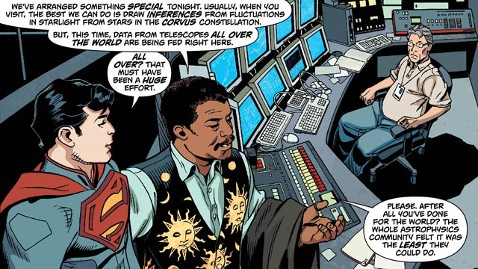 Today’s issue of Action Comics #14 (entitled “Star Light, Star Bright”) features an appearance by world-renowned astrophysicist Neil deGrasse Tyson who shows up to help Superman discover the true location of his home planet of Krypton. Applying real science to the character’s comic book legend Tyson discovered a “red dwarf star designated for having the ability to support a Krypton-like planet is located in the constellation Corvus 27.1 light years from Earth.”
Today’s issue of Action Comics #14 (entitled “Star Light, Star Bright”) features an appearance by world-renowned astrophysicist Neil deGrasse Tyson who shows up to help Superman discover the true location of his home planet of Krypton. Applying real science to the character’s comic book legend Tyson discovered a “red dwarf star designated for having the ability to support a Krypton-like planet is located in the constellation Corvus 27.1 light years from Earth.”
This means, beginning today, and following the coordinates supplied by Tyson, any amateur astronomer can find the little spec of light in the sky known as Krypton. For more you can find the full press release inside.
BURBANK, Calif. (November 5, 2012) – Fact and fiction merge in the newest issue of DC Comics’ ACTION COMICS #14, bringing real world implications to the iconic Superman story. In the explosive back-up story for ACTION COMICS #14 titled “Star Light, Star Bright”, world-renowned astrophysicist Neil deGrasse Tyson helps Superman find his home planet of Krypton on its final day of existence. Today, Dr. Tyson announces an actual location for a Krypton-like system in our known universe. ACTION COMICS #14 hits stores on November 7.
“This is a major milestone in the Superman mythos that gives our Super Hero a place in the universe,” said DC Entertainment co-publisher, Dan DiDio. “Having Neil deGrasse Tyson in the book was one thing, but by applying real world science to this story he has forever changed Superman’s place in history. Now fans will be able to look up at the night’s sky and say – ‘that’s where Superman was born’.”
The red dwarf star designated for having the ability to support a Krypton-like planet is located in the constellation Corvus 27.1 light years from Earth. The star, designated LHS 2520, possesses a red, highly turbulent surface, somewhat cooler and smaller than the Sun. To find it in the night’s sky, amateur astronomers and Superman fans can follow these coordinates:
J2000
Right Ascension: 12 hours 10 minutes 5.77 seconds
Declination: -15 degrees 4 minutes 17.9 seconds
Proper Motion: 0.76 arcseconds per year, along 172.94 degrees from due north
Dr. Tyson has a well-documented history applying science to entertainment in order to make the subject accessible and exciting to the public. He is the Director of Hayden Planetarium at the AmericanMuseum of Natural History, which since its founding in 1935 has served as the premier conduit between the frontier of cosmic discovery and the public’s appreciation of it. Tyson also recently made headlines by getting film director, James Cameron, to alter the night’s sky as seen in The Titanic due to inaccuracies. The adjustment was made and can be seen in the re-release of Titanic 3-D.
Tyson noted, “As a native of Metropolis, I was delighted to help Superman, who has done so much for my city over all these years. And it’s clear that if he weren’t a superhero he would have made quite an astrophysicist.”
“Star Light, Star Bright” is written by Sholly Fisch, a veteran in the educational media field and longtime comic book writer. Fisch and DC Comics editor Wil Moss collaborated with Dr. Tyson on the creation of this epic tale and its real world applications. The story is supported by the stellar art team of Chris Sprouse and Karl Story. “Star Light, Star Bright” appears at the end of ACTION COMICS #14, which features a lead story penned by comic book industry superstar Grant Morrison with art by Rags Morales and Mark Propst.
[via DC Comics]
